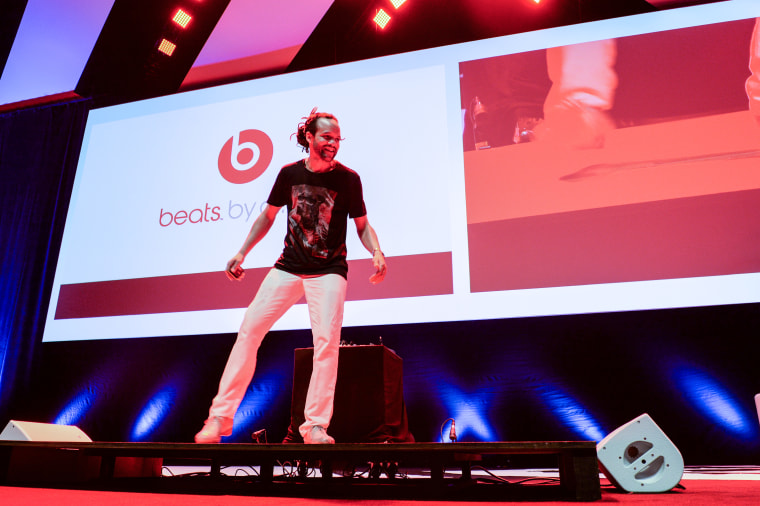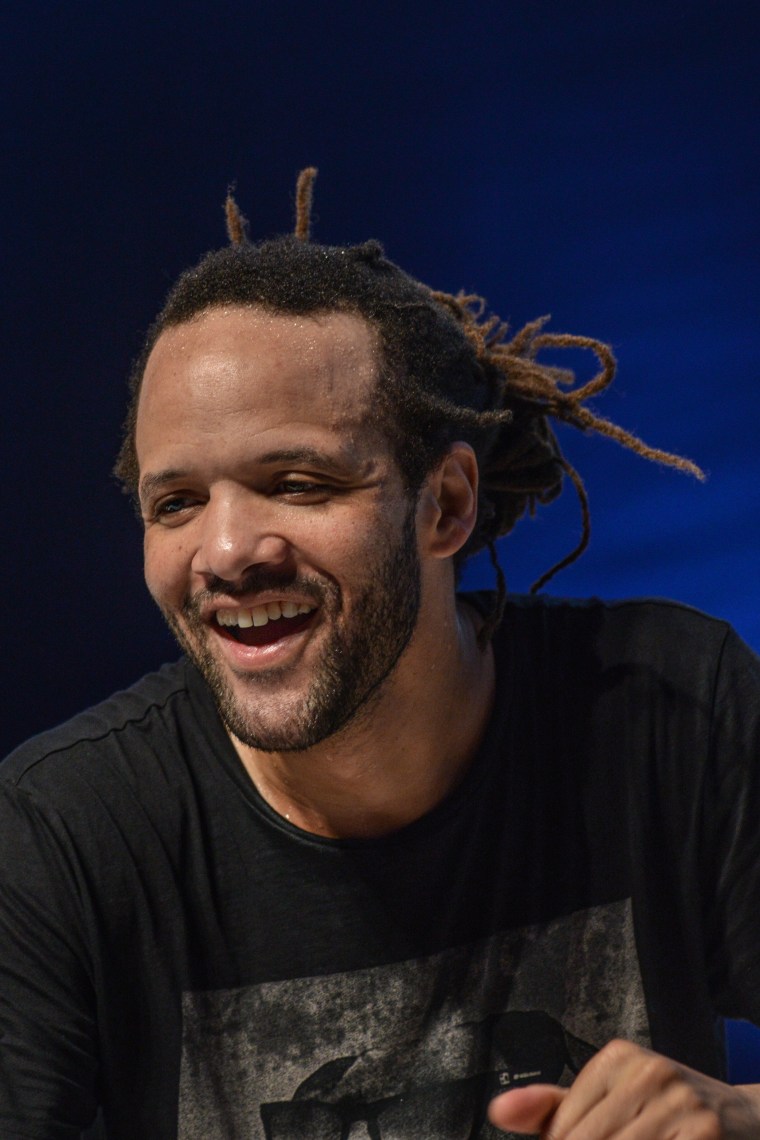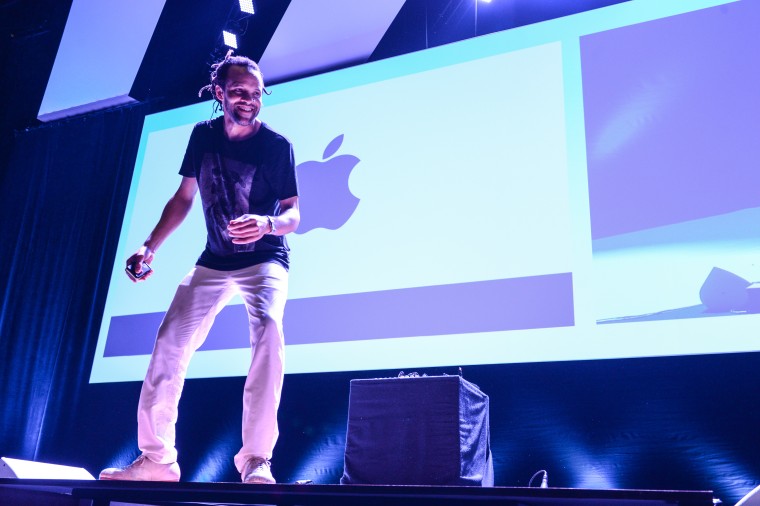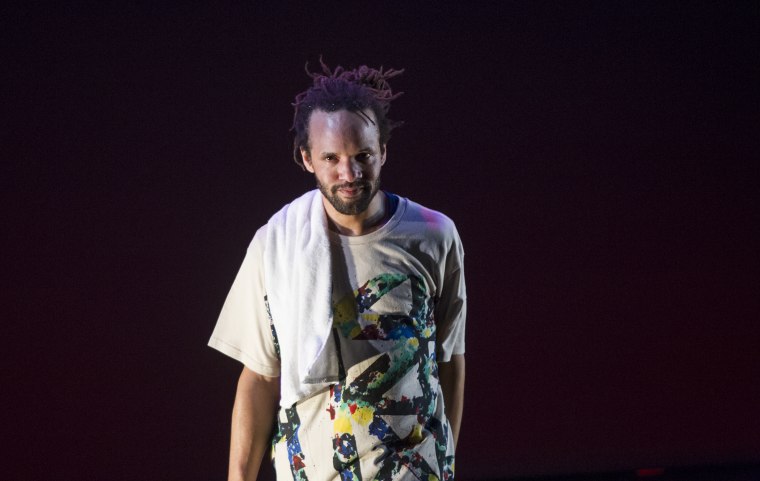Savion Glover has enamored audiences for over three decades now.
Glover who was born in Newark, NJ was introduced to the world of tap dancing at the age of seven when his mother signed him up for classes. But it wasn’t until later when he met tap dancing legend Gregory Hines that he fell in love with the art form.
Hines, who is considered the greatest tap dancer of all time by many, became Glover’s mentor and the rest was history, literally.
In 1985, at the age of 10, Glover made his Broadway debut in “The Tap Dance Kid,” a musical that went on to be nominated for seven Tony Awards. Just four years later at the age of 15, he became one of the youngest performers to ever be nominated for a Tony Award for his role in “Black and Blue.”
In 1996, he won a Tony Award for best choreography in “Bring in 'da Noise, Bring in 'da Funk.”
In 2000, CBS dubbed him “the man who saved tap dancing.”

Over the span of his career, Savion has been featured in Spike Lee’s “Bamboozled,” “Sesame Street,” “So You Think You Can Dance,” “The Jamie Foxx Show,” “Saturday Night Live,” and the 2002 Olympic Winter Games to name a few.
Glover’s career is a testimony to what can happen when you allow creativity, passion, and drive to take over. Therefore, it’s no mystery that whenever there’s a gathering of the world’s top creators Glover’s name is somewhere in the mix.
This year Glover has one more thing he can add to his list of achievements after performing at The 64th Cannes Lions Festival of Creativity which is hosted at the Palais des Festivals et des Congrès in Cannes, France every year.
As a part of the The FCB “Never Finished” Creators Series, with Susan Credle, Glover showcased his famed tap dancing talent and stayed around for a conversation. Credle, who first met Glover about 15 years agowhen she was working on an ad campaign he starred in as a tap dancer, felt like Glover was the embodiment of what it means to "never be finished."
"Glover has been driven by purpose throughout his life. At FCB we believe that when brands, or in this case a person has a purpose, a meaningful reason for being, one will be more successful in the market place and over time will make a greater difference in the world," Credle said.
She added, "When you know what you stand for in the world, you know where to focus. And when you focus, you have a greater impact. What a great lesson for all us."
The seven-day celebration featured creators, pioneers, and trailblazers across multiple fields including entertainment, communications, tech, design, advertising, and marketing. Over the course of the week, industry heavy weights and new comers alike got together for events that ranged from workouts, panel discussions, and concerts.
The festival is also popular for its' award ceremony in which they give out their esteemed ‘Lion Awards’ to professionals who are creatively changing the world with innovative ideas.
This year, the festival’s speaker line-up boasted big names such as Hip Hop artist Asap Rocky, rap duo Run The Jewels, fashion legend Alexander Wang, singer Nick Jonas and Academy Award-winning actress Dame Helen Mirren.
Related: Young, Gifted & Black: Dancer Solomon Dumas Finds His Rhythm
NBCBLK caught up with Savion Glover after his performance at Cannes to talk about what it means for him and the world of tap dance to be a part of such an esteemed event, his love for the art form, and who inspires the living legend himself.
NBCBLK: How were you introduced to tap dancing?
Savion Glover: Well I started off taking basic tap dance classes. My mother just signed us up for basic tap dance classes when I was seven years old, but it really wasn’t until I met these great contributors like Gregory Hines and these old masters of the dance who are no longer with us; people like Jimmy Slyde, Lon Chaney, Henry LeTang, George Hillman sort of just all of these unsung master contributors to the art form of tap and established a relationship with them that I realized this was something I loved.
Again, it’s just like I mentioned on that stage today this whole idea of show business is like secondary when it comes to my love and respect for the men and women responsible for the dance. I am more into the dance. I am more into making sure that their names and their legacies and even their stories continue to be told so that people are aware of who these contributors are. So once I met them I was sort of reintroduced to tap dancing.
So I started tap dance by taking basic tap classes when I was seven but when I met them I was around maybe 10 or 11 years old and my life started to change. I started to understand the dance to be something totally different than the classes that I had been taking. It became my voice and I fell in love with it, but I love them more.

Who inspires you now?
You know, I’m inspired by the littlest things man. I’m inspired by my son, you know, the fact that I have a child in this world and I am now responsible for his well-being and his upbringing. I’m inspired by that.
Other than that, I’m inspired intellectually by people like the Dalai Lama. I’m inspired by Barack Obama. I’m inspired by Oprah Winfrey. I’m inspired by KRS-ONE. I’m inspired by Chuck D. I’m inspired by people who have been my teachers.
I don’t have an immediate relationship with them but I learned through them and I continue to learn. So once my mentors passed and transitioned from the physical, I began to listen and study other people. I’m inspired by John Coltrane. I’m inspired by Roy Haines and other masters of their craft who are great, free musicians. I’m inspired by Ornette Coleman. I’m inspired by Michael Jordan. I just love to learn.
I’m inspired by George Wolfe. I’m inspired by Spike Lee. I’m just inspired by anyone who continues to tell our stories and allows for our narrative to be pertinent and precise and heard. I’m inspired by a lot. I’m inspired by all who are, again, advancing our culture and allowing for our voices to be heard and our stories to be seen.
How does one become a master of their craft and what does it take to get to that level?
Well, I am humbled at the fact that someone would even mention my name in the same sentence as mastery but I believe that mastery comes with death. I am not here yet. I am not finished yet, so when I transition then I will be a master. I am still a student. I still study. So, to me, the idea of master is a matter of opinion.
Of course, we have some. Like I consider John Coltrane a master of the craft. He’s now recognized as being a master of the craft just like Gregory Hines. I think what it takes to be a master is what they do to the craft. Yeah, Gregory Hines was a great tap dancer but the reason why, in my opinion, he’s considered a master is because he advanced the art form. He allowed us to see new ways of "edutainment" if you will.

You know, again, just to repeat people who allow us new ways to tell the story and continue to figure out and help us see the importance of figuring out new ways to tell the story. You know, when you talk about young Black and brown boys or brown girls — if we don’t show them that there is a new way to tell the story then our story might be repeated in a way that is a part of a history that isn’t accurate, if you can dig it.
I am very much in the moment. I am about the moment.
So, if we continue to allow them access to believe that they can tell the story from their point of view I think we’re on the right path. So, masters are a matter of opinion to me.
What do you think it means for the world of tap dancing to be a part of the 2017 Cannes Lions International Festival of Creativity and how did you prepare for this type of event?
You know, I’m best at improvisation. I consider myself and sort of pride myself on my improvisational approach to the dance. I am very much in the moment. I am about the moment. Unless it’s a show and we have a group of dancers, I would then lend some choreography energy but for a thing like today it’s basically improvisation for me.
I was telling Susan today the fact that she has chosen tap dance to be representative of and to do this brand thing is like, we’re not here otherwise. I mean we’re here as a form of entertainment, maybe to do a concert or something like that, but to really be involved and my being here and ability to allow the audience to see that there’s still education to be taught or to be learned through the dance.
Related: Strike A Pose: Documentary Spotlights the Dancers Who Taught Madonna To Vogue
So, I’m honored to be the one who is here representing tap forms on such a platform. It’s really huge for the dance. It’s huge for my art form. I told her also that there are people who she will never meet who are happy and thankful that she chose me or had this idea for tap dancing to be the vehicle to express the characteristics and the feelings and the approaches of these different brands. It’s huge for the art form.
With different dances going viral over the past few years where do you see tap dancing fitting in with newer generations moving forward?
First of all, I’ve been saying this and I hope people don’t take it the wrong way, as long as I’m doing it we’ll be moving in a positive direction. I’m 43 years old man. I knew Hip Hop when it was Hip Hop. The stuff that the kids are doing now, I think they should call it something else.
Same thing with dance. The dances that the kids are doing now are basically dances that were being done by our ancestors in Africa and others places of our ancestry.
The dances that the kids are doing now are basically dances that were being done by our ancestors in Africa and others places of our ancestry.
So, these kids don’t even [know] that if you get enough of them in the room and you get them to do this little twerking stuff these walls are going to come down. It’s going to start to rain. Spirits are going to start forming if they don’t know that these jerks and dances and all this gyrating movements are from another place. Like crumping, all of these things we’ve seen them before, it’s just now the kids are doing them in their form and they’re calling them something else.
So I don’t see tap dancing being anything other than what it once was. Like tap dancing will never change. You know a lot of things don’t change, if you will, they just evolve. They become mature to a specific generation but it’s the same stuff man.
These art forms, these ideas, they’ve been around for years but every now and then you get a generation who lends their energy to it which is okay that’s how it should be. But I see tap dancing going forward. I see whomever is the next generation of tap dancers it’s going to be the same but it’s just going to be produced through their energy.
You know, I was born in the 70’s so I came up through the 80’s and I came up in the 90’s so my approach to dance was at one point very aggressive because I’m waking up listening to ‘Fight the Power’ and N.W.A and the Beastie Boys. I’m listening to all this stuff so that’s what comes out in my tap dance.
Today these kids are listening to Lil Wayne or Jay-Z so they’re going to be inspired by the music or the content they are exposed to but it’s going to be the same tap dance. You know tap dance is not going to be space shoes or people floating. It’s still going to be on the ground, it’s still going to be on the wood.
For me, I consider myself kind of like a purist so I don’t like to fuse the dance with a lot of things. Again, I think it’s a sophisticated approach and smart approach that I can allow one to understand the evolution and the progression of tap dancing without like actually combining Hip Hop dance with tap.
It’s like I’m a musician so instead of bringing Hip Hop into tap I can allow you to see the musicality. I will allow you to see the Hip Hop influence then I will allow you to hear the reggae influence. I will allow you to hear these things versus one who thinks that in order for a generation to get it they have to mix twerking or throwing your hair around with tap dancing.
That’s not really it, then we’re throwing the kids off. We’re saying that it’s one thing when it’s really not in my opinion.
How do you get the new generation to be interested in tap?
By reminding them that this is ours. I think it’s important to allow them to understand the importance of a gift. There are two approaches to tap dancing in my opinion. It’s just like dancing. Some people treat it like prayer or like a belief and it becomes like a ritual.
I believe that my approach to tap dancing is the Gregory Hines approach, the Jimmy Slyde approach, the Nicholas Brothers approach. These approaches are approaches that allow one to either be able to fall into a meditative state or fall into a prayer state. It’s not just entertainment. We’re not just doing this for the sake of applause. We’re doing it so that we can tell these stories. Then you have tap dancers who do it just for the sake of applause.
So as long as we continue to allow the kids to understand that this is just another way for you as a person of color to continue to tell you story. You can do it through art, you can do it through playing an instrument, you can do it through literally art, you can do it through dancing.
But again, make it educationally accessible and stay true to the fact that these are traditions that have to be continued. It can be done through ballet, it can be done through modern, it can be done through lyrical, tap dancing is up there in that category to me. It’s a way that allows us to continue telling our story.
[This interview has been edited and condensed for clarity]
